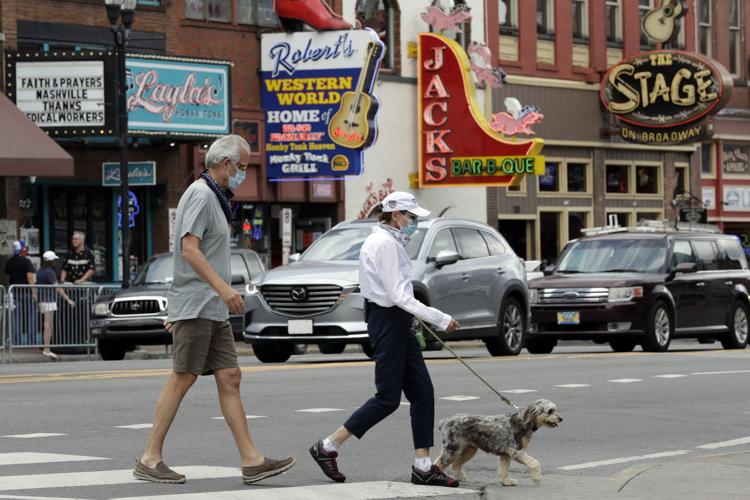Tennessee Attorney General finds mask mandates constitutional

People wear masks Tuesday, June 30, 2020, as they cross Broadway in Nashville, Tenn.
(The Center Square) – Tennessee’s Attorney General has issued an opinion that mandates requiring citizens to wear face coverings to prevent the spread of COVID-19 is constitutionally defensible.
The opinion addresses whether mask mandates infringe on constitutional right to liberty and freedom of speech, and whether local governments have authority to issue such mandates. In both cases Attorney General Herbert Slatery wrote that mandated mask wearing is constitutionally defensible as a response to the COVID-19 pandemic.
“As a general proposition, a governmental mandate that requires the general population to wear face coverings in public due to the health emergency caused by COVID-19 would be constitutionally defensible,” the opinion reads.
On infringement of constitutional rights, Slatery opined that mandating facial coverings do not “impermissibly infringe on a person’s constitutional right to liberty or freedom of speech.” Citing legal challenges to Tennessee’s seat belt law and motorcycle helmet laws, in which courts found that such laws do not violate constitutional prohibitions against taking liberty without due process, Slatery found that similar challenges against mask mandates would likely not be successful.
“It follows that a challenge to a governmental face-cover mandate as violating the constitutional right to liberty is almost certain to be rejected by the courts,” the opinion reads. “The face-cover mandate is likely to be held to be a reasonable regulation to mitigate the transmission of COVID-19 and would not constitute an unconstitutional infringement on liberty interests.”
According to the opinion, mask mandates also stand up to a two-pronged legal test of a community’s right to protect against disease: a mandate must have both “real or substantial relation” to the COVID-19 health crisis, and not amount to a “plain, palpable invasion of rights secured by the fundamental law.”
“Requiring a person to wear a face covering during a comparable public health crisis is no more invasive – indeed is arguably less invasive – than requiring a person to be vaccinated,” the opinion reads. “Even though some may be unconvinced that wearing face coverings is an effective way to thwart the spread of COVID-19, courts may not second-guess governmental officials when the measures they enact in response to a public health emergency are not arbitrary or unreasonable.”

